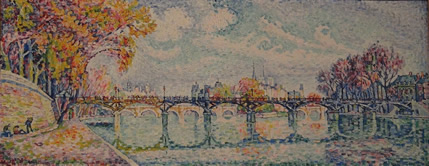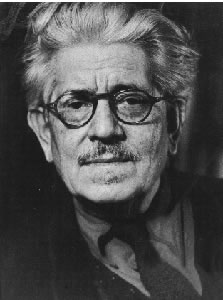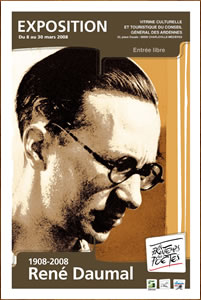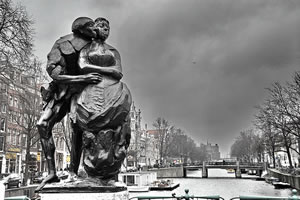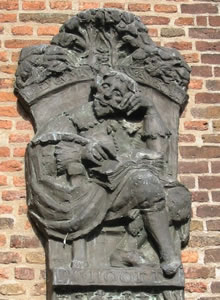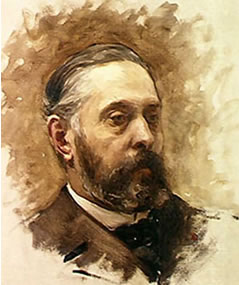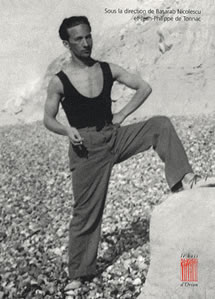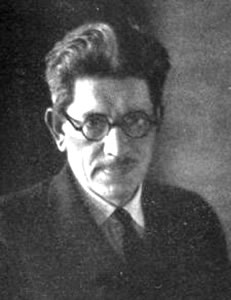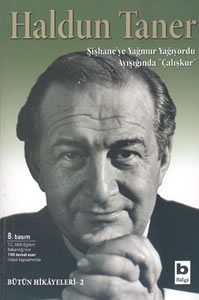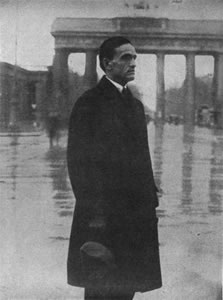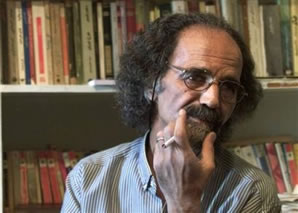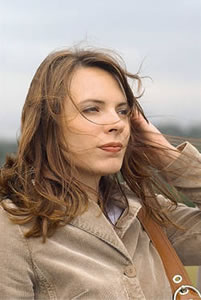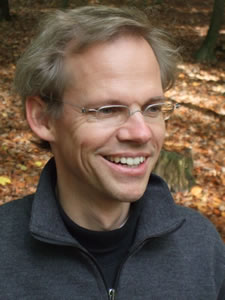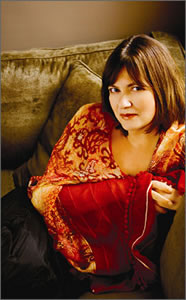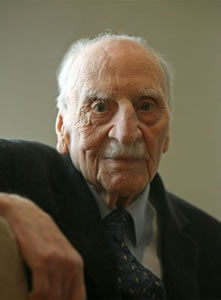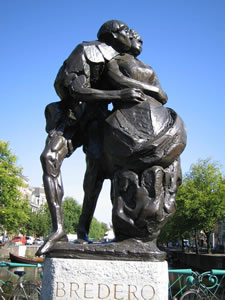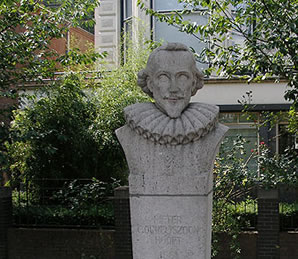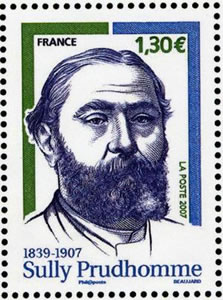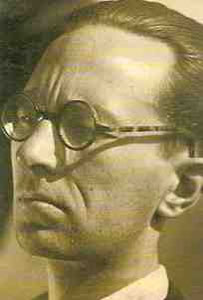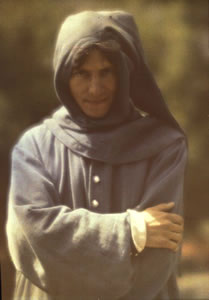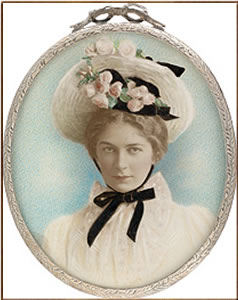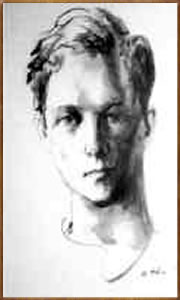De Franse schrijver en dichter Sully Prudhomme (eig. René François Armand Prudhomme) werd geboren op 16 maart 1839 in Parijs. Zie ook alle tags voor Sully Prudhomme op dit blog.
À l’océan
Océan, que vaux-tu dans l’infini du monde ?
Toi, si large à nos yeux enchaînés sur tes bords,
Mais étroit pour notre âme aux rebelles essors,
Qui, du haut des soleils te mesure et te sonde ;
Presque éternel pour nous plus instables que l’onde,
Mais pourtant, comme nous, œuvre et jouet des sorts,
Car tu nous vois mourir, mais des astres sont morts,
Et nulle éternité dans les jours ne se fonde.
Comme une vaste armée où l’héroïsme bout
Marche à l’assaut d’un mur, tu viens heurter la roche,
Mais la roche est solide et reparaît debout.
Va, tu n’es cru géant que du nain qui t’approche :
Ah ! Je t’admirais trop, le ciel me le reproche,
Il me dit : « Rien n’est grand ni puissant que le Tout ! »
Homo sum
Durant que je vivais, ainsi qu’en plein désert,
Dans le rêve, insultant la race qui travaille,
Comme un lâche ouvrier ne faisant rien qui vaille
S’enivre et ne sait plus à quoi l’outil lui sert,
Un soupir, né du mal autour de moi souffert,
M’est venu des cités et des champs de bataille,
Poussé par l’orphelin, le pauvre sur la paille,
Et le soldat tombé qui sent son cœur ouvert.
Ah ! parmi les douleurs, qui dresse en paix sa tente,
D’un bonheur sans rayons jouit et se contente,
Stoïque impitoyable en sa sérénité ?
Je ne puis : ce soupir m’obsède comme un blâme,
Quelque chose de l’homme a traversé mon âme,
Et j’ai tous les soucis de la fraternité.
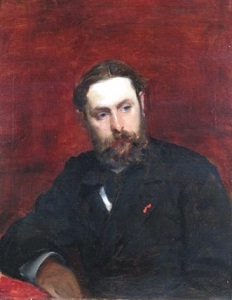
Sully Prudhomme (16 maart 1839 – t september 1907)
Portret door Carolus-Duran, 1879
De Franse schrijver en dichter René Daumal werd geboren op 16 maart 1908 in Boulicourt in de Ardennen. Zie ook alle tags voor René Daumal op dit blog.
Feu aux artifices
Les manèges tournent
avec leurs carrosses de plâtre doré,
les sirènes aux cheveux jaunes soufflent
de leurs grandes poitrines creuses,
le malheur entre dans la ville,
parmi les palais bâtis par des fous,
le malheur entre dans les châteaux de cartes,
dans les carcasses de plâtre des maisons,
dans les manèges dorés.
Mettons le feu à la cité,
les sirènes du manège flambent,
les couleurs de leurs joues se rehaussent,
le malheur, main de fer, demeure,
parmi les rires de braises,
et l’odeur du carton verni
qui brûle rose.
La main de fer demeure
plus brûlante et plus sûre,
beau malheur luisant dans les cendres,
dernière certitude, que caches-tu dans ta paume ?
ouvre les doigts, main dure mais solide,
que je pose mon front brûlé
dans ta chair vive et ferme,
saignante de soleil tueur.
Après
Je vais renaître sans cœur, toujours dans le même univers, toujours portant la même tête, les mêmes mains, peut-être changées de couleurs, mais cela même ne me consolerait point.
Je serai cruel et seul et je mangerai des couleuvres et des insectes crus.
Je ne parlerai à personne, sinon en paroles d’insectes ou de couleuvres nues, en mots qui vivront et riront malgré moi.
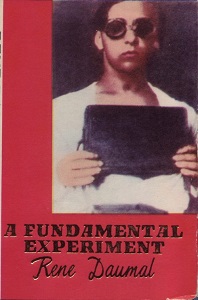
René Daumal (16 maart 1908 – 21 mei 1944)
Cover
De Franse dichter Patrice de la Tour du Pin werd geboren op 16 maart 1911 in Parijs. Zie ook alle tags voor Patrice de la Tour du Pin op dit blog.
Noces
Lorsque je vais vers toi de toute ma chair,
Refaisant l’admirable dessin de la femme
Avec les lèvres et les mains, la lumineuse
Prise de ton corps vierge dans le mien,
Il n’est d’autre mer pour le fleuve que je suis,
D’autre ciel pour le cri de bonheur que je suis,
D’autre champ pour le germe d’amour que je suis,
Et je ferme le corps que nous faisons ensemble
Et je peux à la fin déborder de mon être,
A ton ventre et ta gorge, estuaires de la vie,
Et nous reprenons souffle l’un dans l’autre, au vent
Venu des profondes vallées sensuelles,
Et nous sommes du rythme éternel retrouvé.
Parce que d’un baiser tu changes tout un monde,
Que j’anime les grandes forces pures de ta chair,
Qui n’avaient pas, enfouies, trouvé leur plénitude,
Et qu’au travers de l’instant nuptial, je sais être
Sur l’immense courant qui joint les solitudes
Des hommes depuis toujours, et la solitude divine
A la leur, et tout près, cette solitude de nous-mêmes,
A celle de la vie que nous faisons éclore.
Et qu’au-delà de mon amour, mais bien en lui,
Je refais l’admirable dessin de ton âme
Tel qu’il fut au sourire divin, avec les sens
De l’âme errant sur elle comme mes mains
Sur ton corps, pour retrouver celui qui m’a fait naître,
Au-delà de cet engendrement indéfini des pères
Jusqu’à l’enfant qui nous ressemblera…
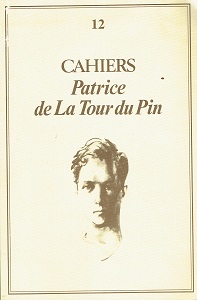
Patrice de la Tour du Pin (16 maart 1911 – 28 oktober 1975)
Cover
De Amerikaanse dichter en schrijver Percy MacKaye werd geboren op 16 maart 1876 in New York. Zie ook alle tags voor Percy MacKaye op dit blog.
Uriel
(In memory of William Vaughn Moody)
III
The simplest is the inexpressible;
The heart of music still evades the Muse,
And arts of men the heart of man suffuse,
And saddest things are made of silence still.
In vain the senses thrill
To give our sorrows glorious relief
In pyre of verse and pageants volatile,
And I, in vain, to speak for him my grief
Whose spirit of fire invokes my waiting will.
IV
To him the best of friendship needs must be
Uttered no more; yet was he so endowed
That Poetry because of him is proud
And he more noble for his poetry,
Wherefore infallibly
I obey the strong compulsion which this verse
Lays on my lips with strange austerity—
Now that his voice is silent—to rehearse
For my own heart how he was dear to me.
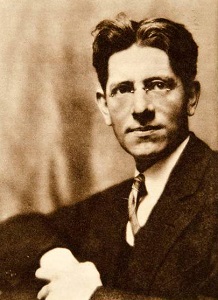
Percy MacKaye (16 maart 1875 – 31 augustus 1956)
De Duitse dichter Jakob Haringer werd als Johann Franz Albert geboren op 16 maart 1898 in Dresden. Zie ook alle tags voor Jakob Haringer op dit blog.
Der Dichter
Alles Glück, es ward nie Seligkeit,
Und der schönste Stern wird nie zum Licht,
Aber auch das tiefste Erdenleid
Ward kein Leid: es wird bloß zum Gedicht!
Und des Lebens schönste Dinge sind
Strophen bloß und euerm Herz zum Tand:
Jeder Dichter ist ein blindes Kind.
Worte sind sein armes Vaterland!
Sucht auf alles Leben nur den Reim!
Ach der Reim ihm alles Sein verdirbt –
Fand er keine Hand und kein Daheim.
Der ist Dichter bloß, der ewig stirbt.
Dichter ist nur, wer nie ein Gebet
Und als Toter durch das Leben geht.
Ist die Welt ihm eine tote Stadt,
Weil er bloß sein Herz zum Leben hat –
Mädchenlied
Es leuchtet so schön die Sonne
Und ich muß müd ins Büro,
Und ich bin immer so traurig,
Ich ward schon lang nimmer froh.
Ich weiß nicht, ich kanns nicht sagen,
Warum mir immer so schwer,
Die anderen Mädchen alle
Gehn lächelnd und glücklich einher.
Vielleicht spring ich doch noch ins Wasser,
Ach, mir ist alles egal,
Käm doch ein Mädchenhändler
Und es war doch Sommer einmal!
Ich möcht ins Kloster und beten
Für Andre, daß’s ihnen besser geht
Als meinem armen Herzen,
Dem hilft kein Stern, kein Gebet.
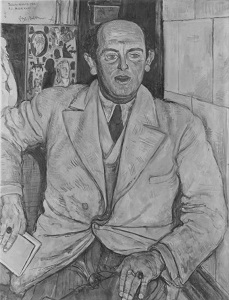
Jakob Haringer (16 maart 1898 – 3 april 1948)
Portret door Erich Büttner, 1931
De Australische dichteres en schrijfster Ethel Anderson werd geboren op 16 maart 1883 in Leamington, in Warwickshire, Engeland. Zie ook alle tags voor Ethel Anderson op dit blog.
Uit: Tales of Parramatta and India.
“A picnic was to celebrate Miss Aminta Wirraway’s seventeenth birthday, chiefly because it was the one form of entertainment likely to be eschewed by the ‘agéd’. “Though I do not call people really old till they take their baths with the door open,” Victoria McMurthie had observed, “people begin to be elderly when they look thoughtful after eating apple dumplings – “. “— “Or when they refuse toffie”- “Speak when you are spoken to, Albertina McMurthiel” Victoria silenced her younger sister, and continued. “But though we are not old we will leave 1 our bathing-dresses behind. Why should we suddenly become stand-offish with each other when we have shared a hot tub every Saturday night until lust lately?” “And when Donalbain (who is four) thinks nothing of coming into the nursery to borrow the soap?” “Alberteena! How often must I tell you, speech is silver, silence Is gold?’ Victoria again quenched her sister, “So why be squeamish?” she added, and , before climbing into her place In the buckboard, she hid nine voluminous sets of garments, made of many yards of ; serge and decorated with white Vandyked I braid, behind the hedge.
The rectory buckboard, an unwired aviary filled with chirping girls, and drawn with cloppy, animation by “old” Ruby (who rising two), then set off, to creak, to hesitate, to side-slip in the ruts of the sandy track that led from Mallow’s Marsh to Lanterloo Bay.
The road was often repaired with bridging, of wattle saplings laced to. ; gether with rope or vines, yet over the creeks there were no bridges ; these had to be forded with a great splashing of water and many shrieks of excitement. However, Juliet McCrea was a dashing whip–she brought her gay passengers safely to the harbor’s rim. And in Lanterloo Bay, the sand’s golden half-moon, the calm yet mettle-some hiss of the placid sea, the entirely conventional sky—how charming! Lying after her dip to dry her pliant body in the warm, down-soft sand, each girl paid tribute to its beauty. “Such a blue sky, such a radiant sea, not a cloud, not a wave, not a wrinkle on the water.” For once Alberteena was allowed her say. —The sea is darker than the sky.” • “Where we lie, above high-tide mark, the sand is as fine as icing-sugar, and it is never covered with seaweed or shells.” “What I like best is the smell of the umbrella-fern coming from that creek.” “The sea smells of lobster.” Juliet McCrea, as usual, was seeking after truth. She sniffed with a scientific expres-sion on her glowing face, the hardly-stirring waves that lapped her young, sunlit body, which from top to toe rivalled a ripe’ apricot in color. “Juliet!” Aminta felt it necessary to assert her age.”
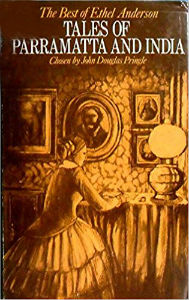
Ethel Anderson (16 maart 1883 – 4 augustus 1958)
Cover
De Turkse schrijver Haldun Taner werd geboren op 16 maart 1915 in Istanboel. Zie ook alle tags voor Haldun Taner op dit blog.
Uit: The Ballad Of Ali Of Keshan (Vertaald door Nüvit Özdoğru)
“Temel: The man who built the great dam?
İhya: Yes, ma’am! I need two hundred more laborers. Since you’ve set up an organization here, I don’t have to go from coffeehouse to coffeehouse looking for men who’re fit.
Hafize: You said it.
Niyazi: Indubitably.
Temel: You’re right.
Nuri: It’s your birthright.
Ali: Niyazi, you take the gentleman to my office! I’ll be right over.
NİYAZİ takes İHYA to the coffeehouse.
Dervish: You see how Ali has brought us good luck? No sooner than he started work two hundred hungry folks began to smile again.
Chorus: True! True! He’s brought us good luck.
Ali: Unity has begun to pay off… Article 8: There will be no interference with any and all tradesmen and artisans and street hawkers. That is to say, we’re for free enterprise. No one will force any tribute on them.
Chorus: Bravo! Long live!
Ali: Except myself.
First Citizen: Now, isn’t that nice!
Chorus: Well, you can’t have everything.
Ali: But even here justice and fairness will be our motor. Tributes will be determined according to each man’s financial portrait.
A Voice: What kind of program is this?
Ali: Well, friends, you’ve heard it all. I trust that you’ll help me make this program a reality. To the outside we have to look like a homo – a homogenerous bunch. So, I will now appeal to the popular vote. All those who give unqualified support to this program raise their right hands!”
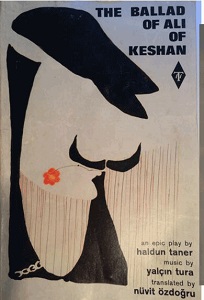
Haldun Taner (16 maart 1915 – 7 mei 1986)
Cover

